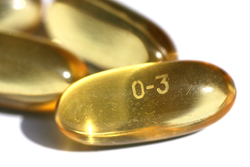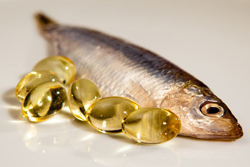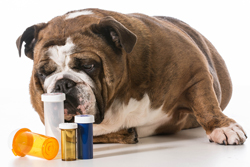Dog Fatty Acid Supplementation

Dog Fatty Acid Supplementation
There is a lot of information available about fatty acid supplementation, but you almost have to be a chemistry major to make sense of it. As a former chemistry major myself, maybe I can pick out the useful parts! A fatty acid is essentially a long molecule chain of carbon and hydrogen. If you have three attached to each other in a row, not a line, it becomes a triglyceride (tri means 3).
People talk about “saturated” v/s “unsaturated”. If there is a hydrogen on every available space for one, with no gaps, it is said to be saturated (with hydrogen). It makes a difference because this determines its shape and whether it can fit into certain areas of a cell membrane, or form other molecules. Saturated fatty acid molecules are able to fit together very tightly which allows them to form solids, like lard. Unsaturated ones form liquids like corn oil. As a general statement saturated fats are the bad artery-clogging ones. Just for fun, let’s mention the hydrogenated (hydrogen-ated) ones. They are unsaturated fatty acids (empty spaces for hydrogen) that are force-saturated with hydrogen in the lab. These are even worse for you than saturated ones. For one reason, they are now saturated and become solid fats which is bad enough; but some of the added hydrogen’s are folded backwards creating an abnormal shape that your body’s enzymes can not break down. Double bad! These with the folded part are the dreaded trans fatty acids.
Dog Omega-3 Fatty Acid

Dog Omega-3 Fatty Acid
Specific fatty acids have names based on their molecular formation as well as names that give a clue as to their origin or activity. The most important one that has proven health benefits so far is the omega-3 fatty acid. The name refers to the location on the molecule where a certain component is attached. It is unsaturated, which is good, and is an essential fatty acid, meaning it can not be made/formed by the body, but must be ingested in its useful form.
Whether or not a dietary component is essential is species specific, so from now one we are mostly talking about dogs. There are two main groups of omega-3s, those of plant origin (ALA for short) and commonly found in flax and pumpkin, and those of fish/shellfish origin (DHA & EPA) primarily in cold water fish like salmon, mackerel, sardines.
Arthritic Dogs improve on Omega-3 Supplements

Dog Omega-3 Fatty Acids
From a medical standpoint, there have been many studies published showing positive effects from increasing the level of omega-3 fatty acid in the diet. These include: decreasing the amount of inflammatory molecules produced and released by inflamed tissue, decreasing the effects of inflammatory molecules released by inflamed tissue, generating new substances that have anti-inflammatory effects (this applies only to the fish origin types), improving the health of cartilage in inflamed joints, improving the lameness scores of arthritic limbs as measured by how hard the limb lands on a force plate, and several other subjective observations. Much of this research was begun based on subjective evaluations of arthritic dogs that appeared to improve after they were given omega-3 supplements to improve their skin and coat. Since we are in the business of rehab we are interested in these effects.
Omega-3 Fatty Acid Dog Diet
The chemistry is actually the easy part once you start looking at the ways to add omega-3 fatty acids to your dog’s diet. Many dog foods already are supplemented, so before you add more you need to know what you already have. Then decide if you want to buy a supplement in liquid or capsule form or just feed a tin of sardines in oil each week?
There are conflicting opinions on how much is appropriate, the National Research Council suggested 25-50mg omega-3 fatty acids per pound per day is a good goal, but that was published ten years ago. There is always the question of concentration and purity with supplements. Personally, I feed my dogs a tin of sardines in oil with breakfast once a week or divide a large can of salmon – on trash day of course!


Recent Comments